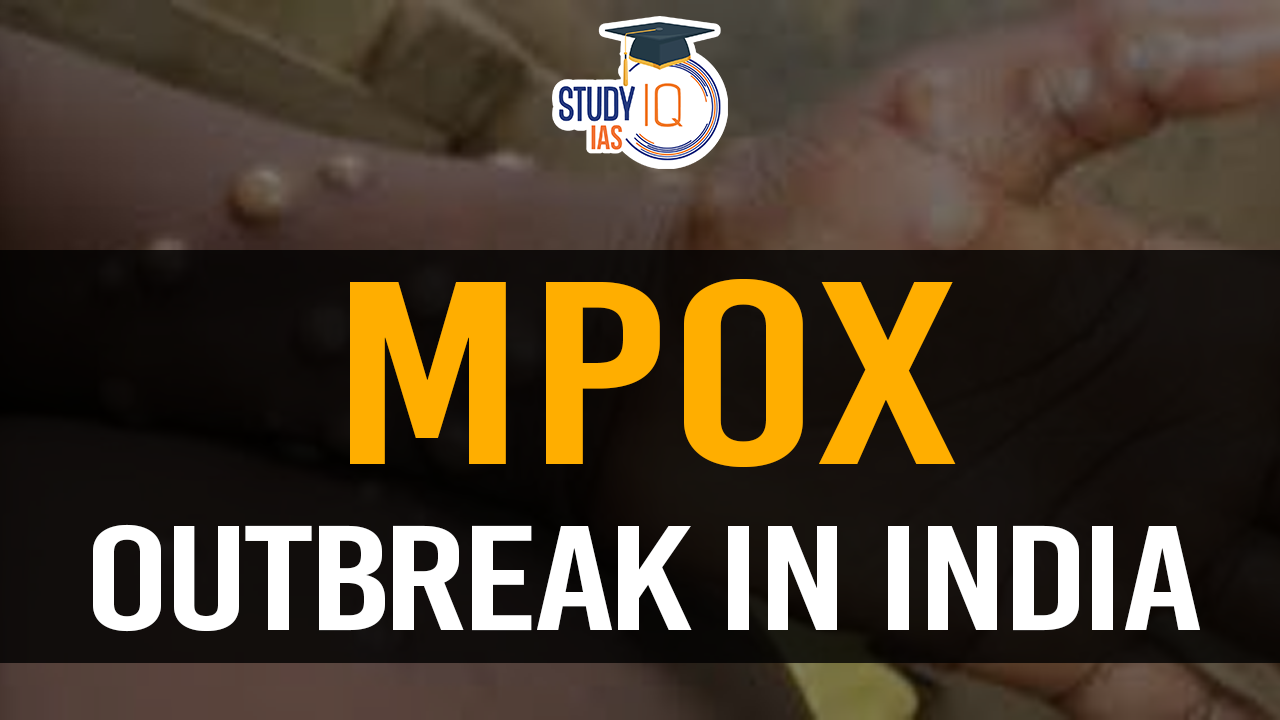Table of Contents
The recent rise in Mpox (formerly monkeypox) cases has been declared a Public Health Emergency of International Concern (PHEIC) by the World Health Organization (WHO) as of August 14, 2024. This designation highlights the need for global vigilance and effective management strategies. For UPSC aspirants, understanding the current Mpox outbreak, particularly in the Indian context, is vital. This article provides a detailed overview of Mpox, its implications for India, and the measures in place to address it.
Recently Democratic Republic of Congo (DRC), the epicentre of the Mpox outbreak received its first donation of Mpox vaccines. Since January 1, 2022, Mpox cases have been reported from 121 countries worldwide.
Bengaluru Airport on High Alert Amid Mpox Outbreak
Kempegowda International Airport in Bengaluru has introduced monkeypox testing kiosks for international passengers, especially those from African countries. Passengers displaying symptoms will undergo a mandatory 21-day quarantine. The airport has implemented strict health protocols, including temperature checks, similar to those during the COVID-19 pandemic. India has reported one monkeypox case in Haryana, with the patient in stable condition. The World Health Organization (WHO) declared monkeypox a public health emergency on August 14, 2024. The virus spreads through direct contact, bodily fluids, or contaminated materials.
What is Mpox?
- It is a viral disease that primarily spreads to the human population through zoonotic spillovers, with rodents and primates serving as potential reservoirs.
- The first case in humans was reported in 1970 in the Democratic Republic of Congo.
- MPox is endemic to central and western Africa.
- Common Symptoms: Skin rash or mucosal lesions, Fever, rash and swollen lymph nodes which may lead to a range of medical complications.
- Transmission: The virus spreads through close contact with infected individuals or animals, including contact with skin lesions, blisters, and contaminated materials. It is not airborne like influenza or COVID-19.
- Diagnosis: Detection of viral DNA by polymerase chain reaction (PCR).
- Vaccines:
- JYNNEOS, ACAM2000 & Modified vaccinia Ankara (MVA)
- These vaccines are weakened versions of vaccinia, a live virus that also served as the basis for the smallpox vaccine.
| Clade-II M-Pox |
|
Current Situation of Mpox Outbreak
Since the onset of the outbreak in 2022, the WHO has reported the following statistics:
- Global Cases: 99,176 cases and 208 deaths across 116 countries.
- Indian Cases: 30 cases have been reported since 2022, with the most recent case in March 2024. The majority of cases in India are linked to travel or involve African nationals residing in the country.
Risk Assessment for Mpox in India
India’s risk of a large-scale Mpox outbreak is assessed as low due to the limited number of reported cases. However, the government has implemented several precautionary measures.
- Risk Factors: The cases reported in India are mostly travel-related or among specific communities.
- Government Measures: Includes heightened surveillance, designated hospitals for isolation and treatment, and enhanced testing facilities.
Government Measures and Public Health Strategy
The Indian government has adopted a multi-faceted approach to manage and mitigate the risk of Mpox:
| Measure | Details |
|---|---|
| Surveillance and Monitoring | Increased vigilance at airports, seaports, and border authorities. Enhanced surveillance systems. |
| Testing Facilities | 32 testing laboratories across the country for rapid diagnosis. |
| Isolation and Treatment | Designated hospitals with specialized facilities for managing Mpox cases. |
| Public Awareness | Campaigns to educate citizens on Mpox symptoms, transmission, and preventive measures. |
| International Cooperation | Collaboration with global health organizations and neighboring countries to share information and strategies. |
Preventive Measures for Individuals
Travellers and residents can follow these guidelines to minimize the risk of Mpox infection:
- Vaccination: While mass vaccination is not currently recommended, travellers from affected areas may consider getting vaccinated based on their risk.
- Hygiene Practices: Regular hand washing, avoiding contact with infected individuals, and maintaining good personal hygiene are essential.
- Isolation: Infected individuals should isolate themselves to prevent the spread of the virus.
Impact of Mpox on Public Health
- Healthcare System: The outbreak strains healthcare resources, requiring effective management of cases and robust surveillance.
- Economic Implications: Although the direct economic impact is currently limited, prolonged outbreaks could affect travel, trade, and tourism.
Conclusion
India’s preparedness and response strategies are designed to mitigate the risk of a large Mpox outbreak. For UPSC aspirants, understanding the details of the Mpox outbreak, including its symptoms, transmission, and the country’s response mechanisms, is crucial for a comprehensive grasp of global and national health issues.
Key Takeaways
- Mpox is a viral zoonotic disease requiring close contact for transmission.
- India has reported a limited number of cases, with strong measures in place to prevent a major outbreak.
- Public health preparedness includes surveillance, testing, isolation, and public education.
- Travellers should follow preventive measures and be aware of symptoms to manage their risk effectively.


 AI and its Regulation in India, Limitati...
AI and its Regulation in India, Limitati...
 Tuberculosis (TB), Symptoms, Causes and ...
Tuberculosis (TB), Symptoms, Causes and ...
 Places in News for UPSC 2025 for Prelims...
Places in News for UPSC 2025 for Prelims...





















